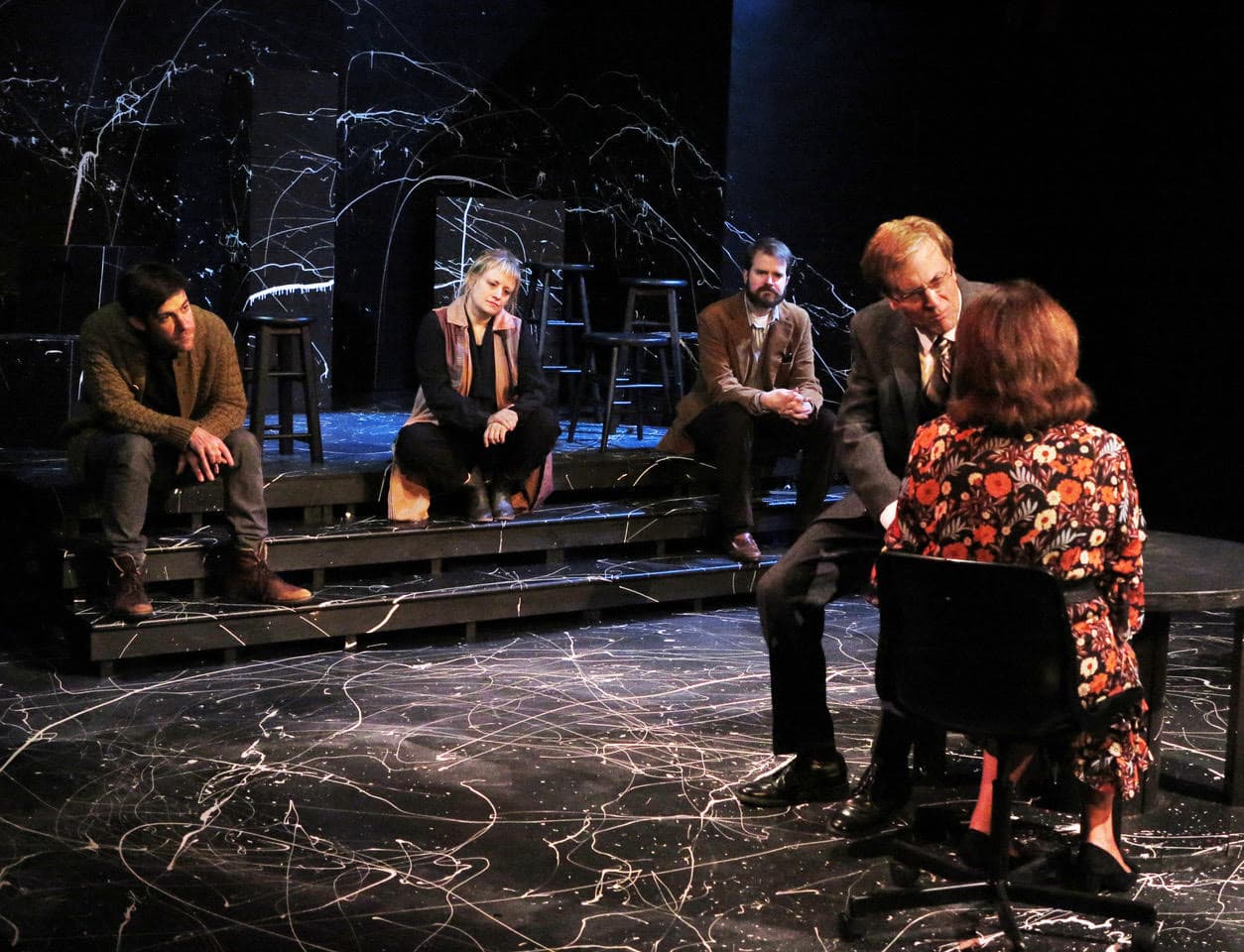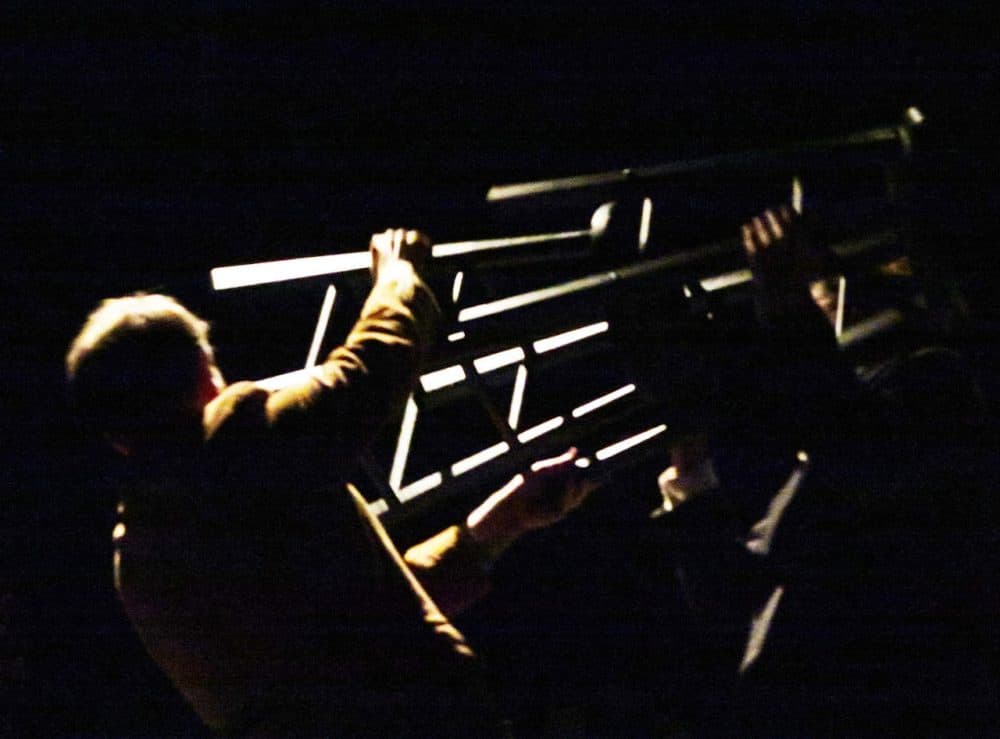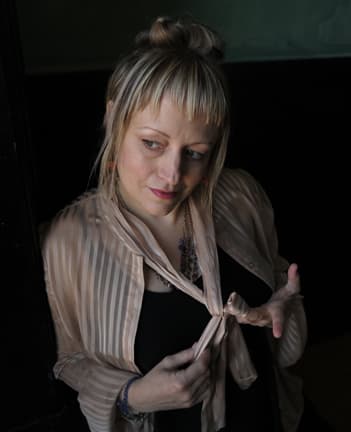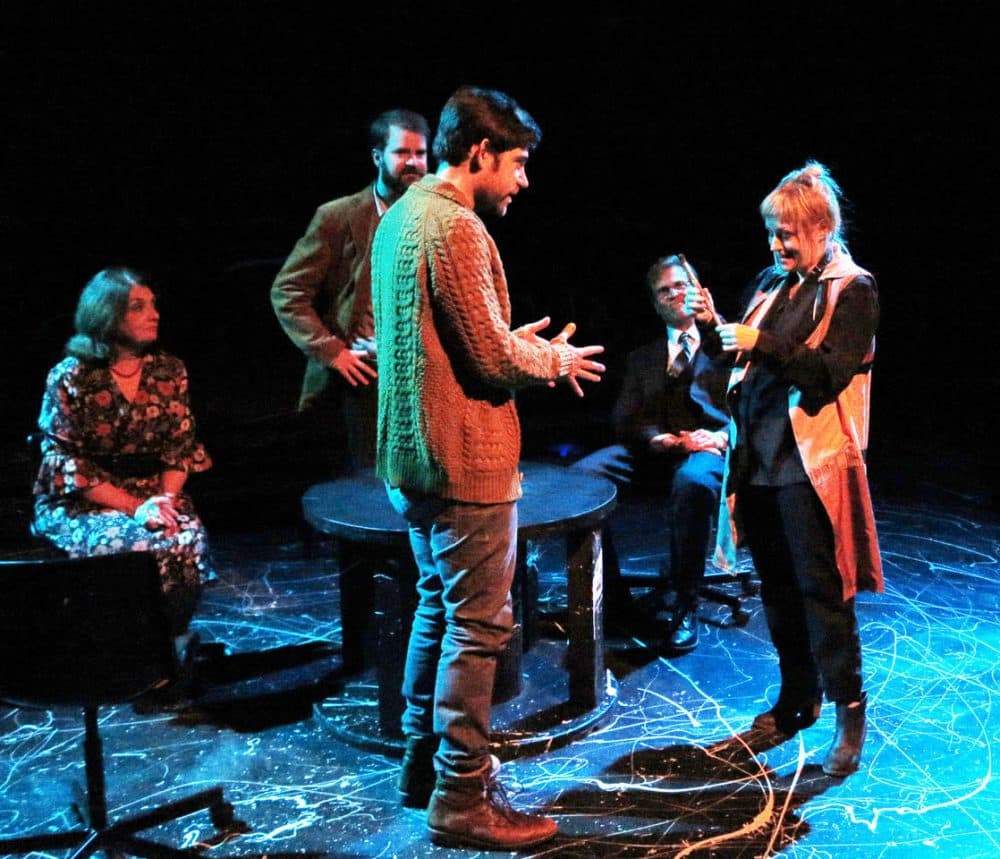Advertisement
Review
At Apollinaire, A 'Winter Solstice' With The Fascist At The Door

Students of autocratic regimes have had cause lately to remind Americans that the undermining of democracy from within tends to happen by insidious degrees, not calamitous turning points that are clearly noted and thus easily resisted as they happen.
Just as the Trump presidency proves itself hostile to political norms — which, it turns out, play as strong a role in preservation of our (seemingly) shared values as do ironclad constitutional dictates — the shared assumptions about acceptable political debate are proving likewise malleable. Finally considered verboten for the past few decades of American life, white supremacy is now increasingly viewed by people who should know better as simply an unpopular viewpoint that must be accommodated in the public square.
Apollinaire Theatre Company's North American premiere of "Winter Solstice," a play by the contemporary German writer Roland Schimmelpfennig, speaks to the growing anxiety that the horrors of the past live on not only as troublesome ghosts but as a cycle that seeks always to repeat itself.
It's almost the mirror image of a similarly conceived piece seen at New Repertory Theatre last year, C.P. Taylor’s 1981 play "Good." The emphasis of that play, about a doctor who becomes a Nazi party member by degrees, was how the terrible can come to seem normal. "Winter Solstice" is more concerned with how the normal can mask something terrible within.
Whether the play expresses that concern in a cogent manner is another matter. Schimmelpfennig mixes a painstakingly achieved subtlety of theme with an aggressively abstract storytelling technique. Even with the clarifying hand of Brooks Reeves, a much-appreciated actor on the local scene who here makes a very self-assured Boston-area directorial debut, the whole business wavers in and out of focus. But in its abstraction it is still haunting.

At the level of plot, "Winter Solstice" is simple. It's Christmas Eve. Bettina (Lindsay Beamish) and Albert (Brian McCarthy), a married couple with a young daughter, are only begrudgingly accommodating their newly arrived houseguest, Bettina's mother Corinna, played by Maureen Adduci. Then Corinna receives a visitor, the distinguished-seeming doctor Rudolph, whom she met on the train earlier that day. Bettina and Albert's friend, a painter named Konrad (Ambjörn Elder), arrives later.
The domestic dramas that ensue are pretty familiar. Bettina and Corinna's relationship is strained, and they bicker while revisiting familiar battlegrounds. Albert, an academic and author with a nervous condition, sneaks away to take a phone call from a young professional peer with whom he may be having a relationship. Konrad is a starving artist with a fondness for wine whose feelings about his work take an aggressively physical turn. All the while, Rudolph charms his new companion with bits of Chopin he plays on the piano and poetic reflections about music bringing order to the universe and the need to "join together" as one in a new sense of community. But his personal details remain mysterious, and we suspect there is something sinister lurking beneath his smooth presentation.

This seems like perfectly good fodder for a kitchen-table drama. But not only does Schimmelpfennig not want "Winter Solstice" to be that kind of play, it's not entirely clear he wants it to be a play at all. Sometimes it seems to want to be a screenplay or a short story. The script (performed in an English translation by David Tushingham) includes extensive narration that sets scenes, offers expository details and also goes inside the heads of the characters. It does a whole lot of "telling" about character details we expect to see shown.
The playwright includes this vague instruction in his script: "Lines in addition to the dialogues are spoken — as far as possible." So Brooks divvies up the narration among his actors. Combined with the abstraction of the stage presentation, which uses few set pieces or props, this gives the audience a lot of work to do in sorting out the basic mechanics of what's happening.
Perhaps the intention is to create an effect like that of a Greek chorus, but it makes for a muddle. The biggest riddle for me was figuring out that one actor, busy onstage from the outset, is playing a character who does not actually arrive in corporeal form until much later.
Schimmelpfennig layers conceit upon conceit, occasionally replaying an earlier incident from a different character's perspective. All the conceptual abstraction sometimes obscures the storytelling rather than enhancing it. But as this Christmas Eve conclave goes deeper into the night, there's more of a woozy sense of the laws of reality coming loose. How much of this is actually happening and how much is a character's fleeting memory struggling to come into focus? Or a boozy fever dream? Is the ghost of a past horror truly present, or is it merely conjured up by a suspicious mind?

The script leaves a trail of breadcrumbs that causes us to hear increasing menace in Rudolph's pronouncements, especially a toast that feels more like a devilish induction ceremony. Thompson is wonderful in the role. He maintains a smooth and inviting veneer, the inevitable collapse of which hits like a cold bucket of water to the face.
Though Apollinaire artistic director Danielle Fauteux Jacques deferred on the directing duties, she provides the set and lighting design. The playing space is set up in a thrust configuration, with the audience on three sides; don't be afraid to choose one of the seats onstage. Cheers to Jacques for continuing to suss out contemporary dramas with a flair for the experimental; the presentation of a new play in translation is particularly appreciated.
Reeves gets very good performances from his whole cast; it's a pleasure to watch this team at work. And while the script offers any number of opportunities to go off track, his direction admirably keeps things running smoothly, preserving the sense of one discrete evening unspooling into the wee hours, even as interludes intrude and chronology misfires by design. Inspired choices, like employing a spare musical backing (sound design is by David Reiffel) while Rudolph describes the orchestration of a completely different-sounding piece, help reinforce the notion that we're viewing a subjective interpretation of actual events.
By show's end, it's unclear what exactly has happened. But there's the uneasy sense that something terrible has raised its head once again, and is slyly poking us to test out how we will respond.
Apollinaire Theatre Company's "Winter Solstice" continues through March 11 at Chelsea Theatre Works.
